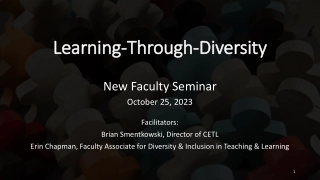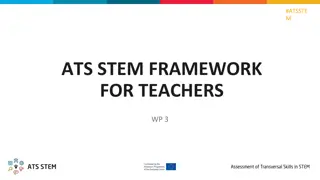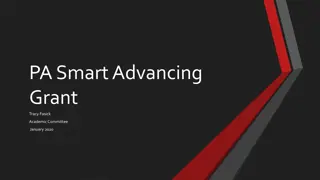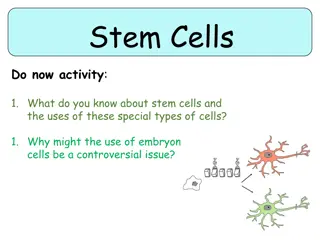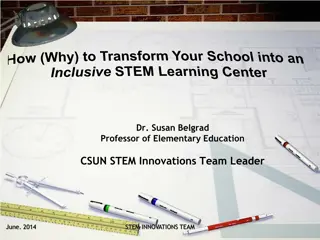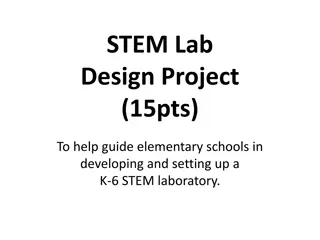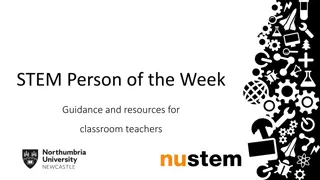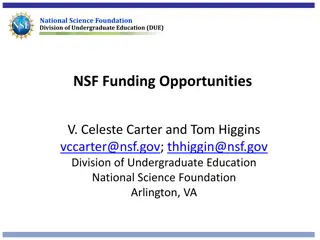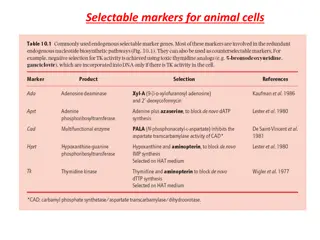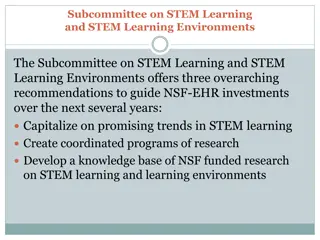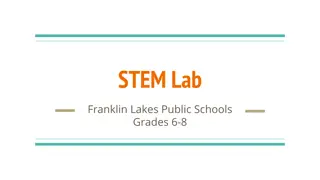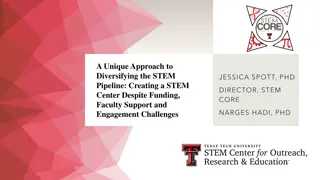
Empowering STEM Education for National Development
STEM (Science, Technology, Engineering, and Mathematics) are crucial for economic growth and societal advancement. Rwanda's vision and strategic policies focus on utilizing STEM to transform its economy, enhance education quality, and foster innovation. The country aims to shift from an agriculture-based economy to a knowledge-based one by 2020 (2050). The education sector strategic plan emphasizes expanding access, improving quality, and enhancing relevance across all levels to meet labor market demands. Specific policy objectives aim to strengthen science and technology teaching, research capabilities, knowledge transfer, and innovation culture. STEM education nurtures critical thinking, boosts science literacy, and cultivates future innovators, driving economic sustainability through new products and processes.
Download Presentation

Please find below an Image/Link to download the presentation.
The content on the website is provided AS IS for your information and personal use only. It may not be sold, licensed, or shared on other websites without obtaining consent from the author. If you encounter any issues during the download, it is possible that the publisher has removed the file from their server.
You are allowed to download the files provided on this website for personal or commercial use, subject to the condition that they are used lawfully. All files are the property of their respective owners.
The content on the website is provided AS IS for your information and personal use only. It may not be sold, licensed, or shared on other websites without obtaining consent from the author.
E N D
Presentation Transcript
by Marie-Christine Gasingirwa (PhD), DG. STR Ministry of Education for the IEEE Entrepreneurship Workshop for Scientists and Engineers, 14/05/2018
Content Background Operatinalisation of the STI Policy - Education reforms - Capacity building - Partnerships Way Forward
Background Introduction ((1): Vision of Rwanda and the Role of Science, Technology and Innovation The belief of the Government of Rwanda in the power of Science for building her Economy Economic Growth, Social Development is embodied in: Revised Vision 2020 EDPRS NICI / SMART Rwanda Plans To transform Rwanda s currently Agriculture- based economy to a knowledge-based economy by the year 2020 (2050). To use Science, Technology and ICT as key enablers of this transformation
Education Sector Strategic Plan goals and targets related to STEM Education Set to achieve three mains goals: (a) expanding access to education at all levels, (b) improving the qualityof education and training, and (c) strengthening the relevanceof education and training to meet labor market demands. To achieve these goals, ten (10) outcomes were developed and one of them relates to STEM: strengthen performance in science, technology and innovation at all levels of education, and application of science, technology and innovation to all sectors of the economy
Science, Technology and Innovation Specific Policy Objectives Knowledge Acquisition and Deepening to reinforce science and technology teaching and resources at all levels of education Knowledge Creation Develop Research Capability in all priority sectors of the economy Knowledge Transfer to reinforce Science and Technology Capability in all priority sectors of the economy Innovation Culture - To encourage Innovation at all levels to help stimulate economic growth STEM education creates critical thinkers, increases science literacy and enables the next generation of innovators. Innovation leads to new products and process that sustain our economy !
- Science, Technology, Engineering and Mathematics (STEM) play a central role in contemporary society, with the potential to improve lives in a multitude of ways and advance national development. - A country s ability to secure good health, fight diseases, protect the environment, produce food for its people, and develop new industries and technologies is dependent on the scientific knowledge and skills of its people. - In an increasingly knowledge-based global economy, harnessing the potential of STEM and integrating them into policy, is critical to achieving national development goals.
Implementation challenges to STEM education I. Students attitudes toward STEM subjects: The mindset that STEM subjects are complicated is hindering the enrollment of students in these subjects. - Lack of guidance and mentorship from the system because those whose determination drives them to venture, do very well! II. Teachers quality and number in STEM Field. - Lack practical expertise in teaching STEM subjects, a weakness in the pre-service teacher training system, - High turn-over rate of qualified teachers to other non- teaching employment services.
Operationalization (1) His Excellency Paul Kagameon STI in Rwanda s Development The application of science and technology is fundamental, and indeed indispensable, to the social and economic transformation of our countries. Productive capacities in modern economies are not based merely on capital, land and labour. They are also dependent on scientific knowledge and sustained technological advances (Speech to Royal Society UK September 2006) It is about applying science and technology holistically in all levels of education and training in commercializing ideas, in developing business and quickening the pace of wealth-creation and employment-generation, in enabling government to provide better services. (Address to: AU Summit Addis Ababa January 2007)
Operationalization (2) Partnerships: To operationalize the STI Policy objectives, one of the ongoing activities of the GoR is to establish Centres of Excellence (CoE) to develop expertise focusing on National and Regional needs East African Institute for Fundamental Research (EAIFR): Partner institute for ICTP, AIMS, CMU, MIT, UNESCO, UNECA, JICA, AfDB, WB, etc.. NB: To create conducive environment for STI objectives attainment.
E.G: East African Institute for Fundamental Research (EAIFR): Partner institute for ICTP An East Africa Institute for Fundamental Research based on activities associated with the International Centre forTheoretical Physics (ICTP) is being established. The Institute is set to offer a two year Masters programme in basic and applied physics and PhD programmes to be established later. The Institute also hosts specific regional schools related to cutting edge areas of physics relevant to Rwanda and the region. Events/Schools hosted to date include: (i) Regional Space Science Summer School -2014 (ii) Regional Geophysics School-2014, (iii) Regional Internet of Things workshop 2015 and (iv) a Biannual African School of Physics ASP2 016. Now hosting this S&T Workshop, 2018.
Education reforms(1) The ambition to develop a knowledge-based society and the growth of regional and global competition in the jobs market has necessitated the shift to a Competency-Based Curriculum (CBC): - Entrepreneurship , (integration of)introduction at all levels of education is meant to -(i) enable learners achieve their full potential in terms of relevant knowledge, skills and appropriate attitudes that prepare them to be well integrated in society and exploit employment opportunities. - (ii) align the syllabus, teaching and learning and assessment approaches in order to ensure that the system is producing the kind of citizens the country needs.
Reforms (2) Focusing on Skills Development by emphasizing the need for Hands-on skills capacity by supporting TVET especially in fighting the mindset , towards production of skilled labour force, a pre-requisite for Industrial development. Elaboration of policies and the National Qualification Framework (RNQF), that stimulate and avail life learning opportunities and self improvement. Generation of Job-creators rather than Job-seekers so as to fight Unemployment, and at times Underemployment, in collaboration with different development partners and ministries, NEP (National Employment Program), Emphasis on Capacity building (CESB)-PSG Project. Encouraging Private Sector engagement in Education system- to enhance relevance of future education products to the need of labour market demands. Promote Technology transfer and partnerships, eg: KTP (Knowledge Transfer Partnership), RIEF (Rwanda Innovation Endowment Fund),etc
Current Situation, Existing Sector Framework and Policies, and the Relationship with STI For example: Need for ICT integration in all sectors: The definition of the SMART terminology stems from: Establishing a Service-oriented, Modern, Accountable, and Real-Time (SMART) Government that drives Rwanda s global competitiveness and job creation; The SMART Rwanda plan is based on around seven(7) main themes: (i)SMART Education, (ii) SMART Government, (iii) SMART Health, (iv) SMART Business & SMART Industry, (v) SMART Agriculture,(vi) SMART Finance, and (vii)SMART National Information Security; and three(3) enablers namely: SMART ICT Capability, SMART ICT Governance and SMART ICT Shared Infrastructure. Thus a firm foundation in STEM education is the key to attaining all these!
Challenges ENERGY Currently nearly 75% of the population Sub-Saharan Africa has no access to electricity. As a result energy needs are fulfilled primarily through the use of biomass with the effect of environmental degradation and adults and children spending significant periods of their day in search of fuel wood. Rwanda s needs and priorities are being focused on to enhance Industrial development! There is a need to develop alternative forms of energy: Most Rwandans live in villages that are not connected to the power grid. Building central generating plants and connecting remote villages to the central grid is neither feasible nor affordable. Therefore, there is a need to develop alternative, decentralized energy sources including wind, solar, thermal, small scale hydro and biofuel etc. to provide energy to rural communities.
Conclusion The importance of technological and scientific capacity for long term sustained economic growth is already an accepted fact. Professor AbdusSalam: Scientific and Technological knowledge is a Human Kind Heritage. The rapid growth of modern science started about 300 years ago in 17th Century Europe. Since then science has built up a substantial body of knowledge both about the world as it now is and about the history of man, the earth, the solar system and the universe. Through modern science, technology and medicine, hundreds of millions of people are alive today who would previously have died in infancy or childhood . Therefore any country pre-occupied with changing the livelihood of their people from poverty to better conditions of living must appropriately invest in science, technology, and innovation.
Way-forward Developing our regional capacity in Science and Technology based Entrepreneurship will help us strengthen many sectors, including health, agriculture, trade and industry, Energy, infrastructure, environment, and ICT, all of which are key sectors in our development. A Challenge to you, young Scientists and Engineers ! The Ball is in your Courts: - to innovate you need to do research for appropriate and relevant policies, commercialization of your products, etc THANK YOU FOR YOUR KIND ATTENTION!


